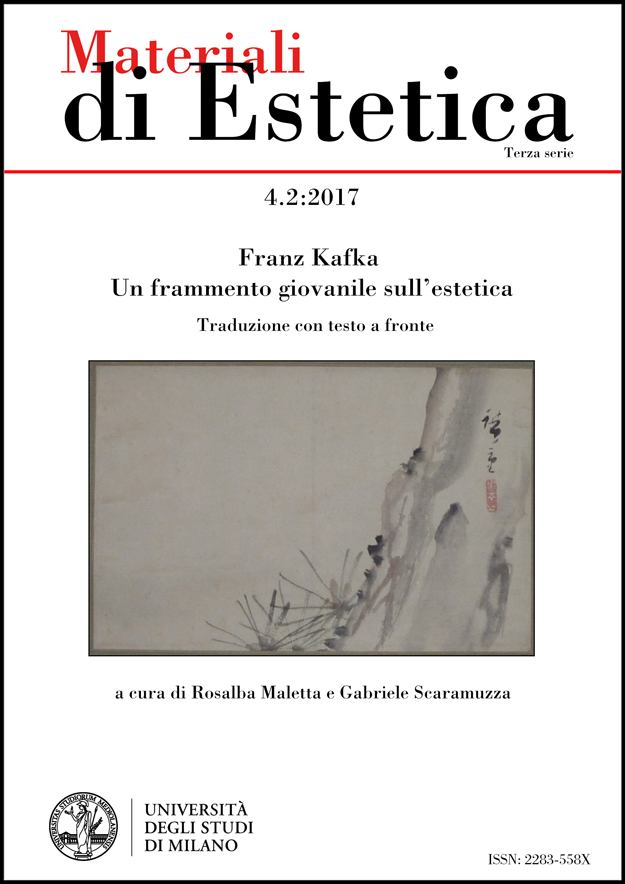Filosofia dell’incertezza. Su un appunto del giovane Kafka
DOI:
https://doi.org/10.13130/mde.v0i4.2.9773Abstract
The paper analyses one of Kafka’s earliest texts by contextualising its philosophical discourse in connection with the teaching of philosophy in contemporary Prague. It starts by referring to Brentano’s supposedly influence on Kafka and it moves on by discussing Max Brod’s tumultuous relation with the Prague Brentanist circle. Kafka’s and Brod’s participation to the Café Louvre philosophical meetings and to the Fanta Salon is also taken into consideration. Finally, the contribution tries to relate Kafka’s fragment to one of its earliest stories: Description of a Struggle (Beschreibung eines Kampfes).
Keywords: Franz Kafka; Franz Brentano; Max Brod; Fanta Circle; Anton Marty
Downloads
Riferimenti bibliografici
ANDERSON, Mark, “Kafka and New York: Notes on a Traveling Narrative”, in A. Huyssen, D. Bathrick (eds.), Modernity and the Text. Revisions of German Modernism, Columbia University Press, New York 1989, pp. 142-161.
BAIONI, Giuliano, Kafka. Romanzo e parabola, Feltrinelli, Milano 1962.
BERGMANN, Hugo, “Biografia del giovane Kafka”, in Moznaim, giugno 1959 [in ebraico].
–, “Schulzeit und Studium”, in H.-G. Koch (a cura di), Als Kafka mir entgegenkam… Erinnerungen an Franz Kafka, Wagenbach, Berlino 1995, pp. 13-24 (traduzione italiana a cura di F. Stelzer, Quando Kafka mi venne incontro… Ricordi di Franz Kafka, Nottetempo, Roma 2007).
–, “Erinnerungen an Franz Kafka”, in Universitas, 7 luglio 1972.
BINDER, Hartmut, Kafka Handbuch. I: Der Mensch und seine Zeit, Kröner, Stuttgart 1979.
BROD, Max, “Zur Ästhetik”, in Die Gegenwart, n. 7 (1906), pp. 102-104; n. 8 (1906), pp. 118-119.
–, Franz Kafka als wegweisende Gestalt, Tschudy, St. Gallen 1951.
–, Franz Kafka. Eine Biographie, Fischer, Frankfurt a.M. 1954 (traduzione italiana a cura di E. Pocar, Mondadori, Milano 1956).
–, “Ungedrucktes von Franz Kafka”, in Die Zeit, 22.10.1965.
–, Der Prager Kreis, Kohlhammer, Stuttgart/Berlin/Köln/Mainz 1966 (traduzione italiana a cura di L. Ferrara degli Uberti, Il circolo di Praga, e/o, Roma 1983).
CORNGOLD, Stanley, Complex Pleasure: Forms of Feeling in German Literature, Stanford University Press, Stanford 1998.
FABIAN, Reinhard (hrsg.), Christian von Ehrenfels. Leben und Werk, Rodopi, Amsterdam 1986.
GIMPL, Georg, Weil der Boden selbst hier brennt. Aus dem Prager Salon der Berta Fanta (1865-1918), Vitalia, Prag 2001.
HEIDSIECK, A., “Physiological, Phenomenological, and Linguistic Psychology in Kafka’s Early Works”, in The German Quarterly, 62, 4 (1989), pp. 489-500.
KAFKA, Franz, Diari 1910-1923, a cura di R. Cantoni, Mondadori, Milano 1959.
–, Nachgelassen Schriften und Fragmente I, hrsg. von M. Pasley, Fischer, Frankfurt a.M. 1993.
KOWALEWSKI, Gerhard, Bestand und Wandel. Meine Lebenserinnerungen zugleich ein Beitrag zur neueren Geschichte der Mathematik, Oldenbourg, München 1950.
KRAUS, Oscar, Anton Marty. Sein Leben und seine Werke, Max Niemeyer, Halle 1916.
LUCCA, Enrico, “Hugo Bergmann e la via verso un nuovo umanesimo ebraico”, in Filosofia e Teologia, 30, 2 (2016), pp. 335-345.
MEHRING, Reinhard, (hrsg.), Ethik nach Theresienstadt: Späte Texte des Prager Philosophen Emil Utitz (1883–1956), Königshausen u. Neumann, Würzburg 2015.
MULLIGAN, Kevin, (ed.), Mind, Meaning and Metaphysics. The Philosophy and Theory of Language of Anton Marty, Klower, Dordrecht/Boston/London 1990.
NEESEN, Peter, Vom Louvrezirkel zum Prozess. Franz Kafka und die Psychologie Franz Brentanos, Kümmerle, Göppingen 1972.
ROSS DICKINSON, Edward, “Sex, Masculinity, and the ‘Yellow Peril’. Christian von Ehrenfels’ Program for a Revision of the European Sexual Order, 1902-1910”, in German Studies Review, 25, n. 2 (2002), pp. 255-284.
RYAN, Judith, “Kafka before Kafka: The Early Stories”, in J. Rolleston (ed.), A Companion to the Works of Franz Kafka, Camden House, Columbia S.C. 2006, pp. 61-83.
SCHULTE, Jörg, “Nachwort”, in Id., Eine Poetik der Offenbarung: Isaak Babel, Bruno Schulz, Danilo Kis, Harrassowitz, Wiesbaden 2004, pp. 219-222.
SMITH, Barry, “Kafka and Brentano: A Study in Descriptive Psychology”, in Id. (ed.), Structure and Gestalt: Philosophy and Literature in Austria-Hungary and her successor states, John Benjamins, Amsterdam 1981.
–, Anton Marty. On Being and Truth, in Id., Austrian Philosophy. The Legacy of Franz Brentano, Open Court, Chicago/La Salle 1995.
STACH, Reiner, Kafka. Die frühen Jahre, Fischer, Frankfurt a.M. 2015.
SVOBODA, Karel, “The Contributions of Emil Utitz to Aesthetics”, in The Journal of Aesthetics and Art Criticism, 16, 4 (1958), pp. 519-524.
VASSOGNE, Gaelle, Max Brod und Prag: Identität und Vermittlung, Niemeyer, Tübingen 2009.
VOIGTS, Manfred, “‘Tod den Toten!’. Indifferentismus und Utopie in den frühen Novellen Max Brods”, in J. Grave, P. Sprengel, H. Vandevoorde (hrsg.), Anarchismus und Utopie in der Literatur um 1900: Deutschland, Flandern und die Niederlande, Königshausen u. Neumann, Würzburg 2005, pp. 108-119.
WAGENBACH, Klaus, Kafka. Eine Biographie seiner Jugend 1883-1912, Francke, Bern 1958 (traduzione italiana a cura di P. Corazza, Biografia della Giovinezza 1883–1912, Einaudi, Torino 1972).
–, Kafka, Mondadori, Milano 1968.






